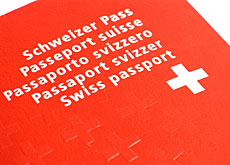Official Romansh still has some way to go

Romansh, a Latin-based language spoken by a tiny minority of the Swiss population, is one of Switzerland's four national languages.
But although Romansh has strong support – on a federal level and in the southeastern canton of Graubünden where it is spoken – the language remains underrepresented in the country as a whole.
For a long time Romansh struggled to be recognised in Switzerland. In 1938 it scored a big triumph when the Swiss population voted to amend the constitution and make it a national language.
However, Romansh had to wait until 1996 for official status. As it is only used for dealings with Romansh speakers, it is known as a “partially official” language.
Until 1996 only German, French and Italian were used for administrative purposes.
There are five different Romansh idioms, but the government uses the standardised version, Rumantsch Grischun (RG).
“A Romansh speaker can write to the government in Romansh – in RG or their idiom – and they get an answer which most of the time will be in RG,” Constantin Pitsch, from the Federal Culture Office’s languages division, told swissinfo.
Pitsch, himself a Romansh-speaker, said the government translates some texts into RG, such as those pertaining to federal votes or elections.
Limited
But this does not necessarily mean that the use of Romansh is widespread.
“The confederation logo is in the four languages as are the [names of government] buildings, but this is more a placatory and symbolic use of Romansh, and does not mean if you have a quadrilingual letterhead the text also has to be in four languages,” said Pitsch.
The take-up of the Romansh-language services seems to be low, which has led to some questioning of the merits of offering Romansh at a federal level, especially considering the translation costs.
“The demand… must come from the Romansh people themselves and we do not really know how many people really read these texts as there has been no investigation into this question,” said Pitsch.
Part of the problem, says Pitsch, is that there is an ingrained resistance to RG, with many Romansh people preferring to use their own idioms.
Furthermore, almost all native speakers are bilingual in German and some even prefer to use it for official communications.
Graubünden
It is a similar story in Graubünden. This is the only officially trilingual canton in Switzerland, yet German is dominant, with Romansh and Italian only spoken by 15 per cent and ten per cent of the canton’s population respectively.
RG is the canton’s official language for communications, but in communes where Romansh is still used – mainly in the Surselva valley and in Lower Engadine – people still prefer their local idioms.
For the defenders of Romansh, such as the Romansh promotion organisation Lia Rumantscha, the language’s official status is very positive. But there needs to more commitment from the government.
“At the moment it’s just the constitutional paragraph 70 which defines us as an official language, but doesn’t give us a lot of rights,” explained the organisation’s Andrea Rassel.
“There is nothing about the implementation of Romansh on a national level… and the visibility of Romansh is almost zero in Switzerland.”
Chance
A new language law should have given more rights to minorities, but was blocked by the government on financial grounds.
But parliament has now put it back on the agenda and will discuss it at the upcoming session in the Romansh-speaking area of Flims.
“We are absolutely hoping for our chance up there and to show that Romansh can contribute quite a lot to Switzerland,” Rassel said.
Despite Romansh not attaining full equality in Switzerland, many agree that federal and cantonal measures have helped keep it alive.
The language has also benefited from the country’s strong attachment to the principle of multilingualism and promotion of minorities. A situation that is perhaps best summed up by David Spinnler, a journalist at Radio and Television Romansh.
“Of course, in economic terms, you could get rid of all the languages and replace them with English… but if Romansh didn’t exist, Switzerland wouldn’t exist. Because Romansh is representative of the cultures and microcosms which make up Switzerland.”
swissinfo, Isobel Leybold-Johnson
1938: Romansh becomes national language.
1982: Rumantsch Grischun introduced.
1996: Romansh becomes partially official language in the form of Rumantsch Grischun.
2001: RG becomes Graubünden’s official language for votes and elections.
2003: Graübunden’s voters accept revision of cantonal constitution, including commitment to trilingualism.
2004: New language law stalls.
This year’s autumn parliamentary session is taking place in Romansh-speaking Flims, in the southeastern canton of Graubünden, from September 18-October 6. It will last three weeks.
As well as an influx of members of the political, economics and cultural sectors, the region of Surselva around Flims is also expecting an increase in visitors.
To mark the event, swissinfo is publishing a series of articles and a dossier on Romansh, delving into the past present and future of Switzerland’s threatened fourth national language.

In compliance with the JTI standards
More: SWI swissinfo.ch certified by the Journalism Trust Initiative

You can find an overview of ongoing debates with our journalists here. Please join us!
If you want to start a conversation about a topic raised in this article or want to report factual errors, email us at english@swissinfo.ch.